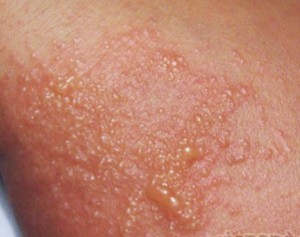Overview
Eczema (atopic dermatitis) is a common skin condition characterized by redness, itching, and dryness. During flare-ups, the skin may appear “weepy” with fluid leakage and yellow crusting. Active lesions can become infected with bacteria (especially Staphylococcus aureus), viruses (such as herpes or molluscum), or fungi (e.g., Candida).
Eczema often begins in early childhood. In infants, it typically appears on the face, trunk, and extensor surfaces but usually spares the diaper area. In children, eczema commonly affects the creases of the elbows, behind the knees, and the ears. Adults may experience persistent eczema on the hands and feet. The condition frequently coexists with asthma, allergic rhinitis, and food allergies. Genetics plays a crucial role, with mutations in the Filaggrin gene linked to more severe disease.
Common triggers include environmental allergens (dust mites, pet dander, pollen), food allergies (e.g., eggs, milk), over-drying of the skin, irritants (e.g., rough fabrics, detergents, soaps, heat, sweat), and stress.
Management
Skin Care
The cornerstone of eczema management is proper skin care:
- Bathing: A lukewarm soak (20–30 minutes) helps cool and hydrate the skin. However, brief hot showers can worsen dryness by promoting moisture loss.
- Moisturizing: After gently patting the skin dry, apply a moisturizer within three minutes while the skin is still damp to lock in hydration.
- Moisturizer Selection: Choose hypoallergenic products, preferably containing ceramides to replenish the skin barrier. Ointments are the most effective, followed by creams, with lotions being the least moisturizing.
Topical Medications
Topical steroids are the primary treatment for flare-ups, reducing inflammation and promoting healing. They come in various strengths based on disease severity. While concerns exist about steroid side effects (e.g., skin thinning, hypopigmentation, acne, folliculitis), correct usage minimizes risks while improving quality of life.
For cases where strong steroids are not advisable—such as on the face—non-steroidal topical treatments are available, including:
- Calcineurin inhibitors (Tacrolimus [Protopic], Pimecrolimus [Elidel])
- PDE4 inhibitors (Crisaborole [Eucrisa], Roflumilast [Zoryve])
- Janus kinase (JAK) inhibitors (Ruxolitinib [Opzelura])
- Aryl hydrocarbon receptor agonists (Tapinarof [Vtama])
Itch Management
Antihistamines can help control itching, preventing scratching that worsens inflammation. Scratching triggers mast cells to release histamine, perpetuating a cycle of itching and irritation. Managing nighttime itch is particularly important for preventing sleep disruption.
Infection Prevention
Skin infections, especially with Staphylococcus aureus, can worsen eczema. Depending on severity, oral or topical antibiotics may be prescribed. Regular bleach baths (following medical guidance) can help reduce bacterial colonization.
Allergy Considerations
If allergies are suspected as triggers, testing may be helpful, but interpretation requires caution. The skin’s heightened sensitivity may cause false positives in allergy tests, and serum IgE levels may be falsely elevated. This is especially relevant for food allergies—only about one-third of people with moderate-to-severe eczema have true food allergies. Unnecessary dietary restrictions should be avoided unless a clear correlation is established.
Advanced Treatments
For severe eczema unresponsive to topical therapy, injectable biological agents and oral JAK inhibitors may be considered:
-
Injectable biologicals:
- IL-4 & IL-13 inhibitors: Dupilumab (Dupixent)
- IL-13 inhibitors: Tralokinumab (Adbry), Lebrikizumab (Ebglyss)
- IL-31 inhibitors: Nemolizumab (Nemluvio)
-
Oral JAK inhibitors:
- Abrocitinib (Cibinqo)
- Upadacitinib (Rinvoq)
Oral JAK inhibitors may offer effective treatment but carry a risk of broader immune suppression, which can lead to potential side effects and requires careful monitoring.
Additional Self-Care Tips
- Trim nails to minimize skin damage from scratching.
- Use mild, fragrance-free soaps and detergents.
- Wear soft, breathable fabrics (preferably cotton or silk).
- Maintain indoor humidity around 35% (higher humidity can promote dust mites and mold).
- Avoid overheating and excessive sweating. Shower after workouts.
- For infants with facial eczema, apply a barrier cream (e.g., Vaseline) to protect against food and saliva irritation.
By following a comprehensive care approach, individuals with eczema can manage symptoms effectively and improve their quality of life.
